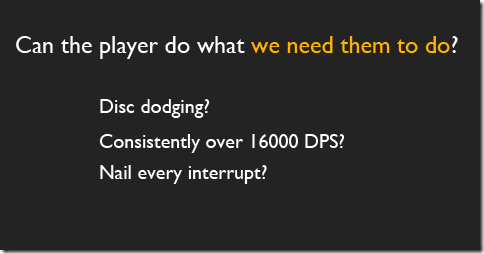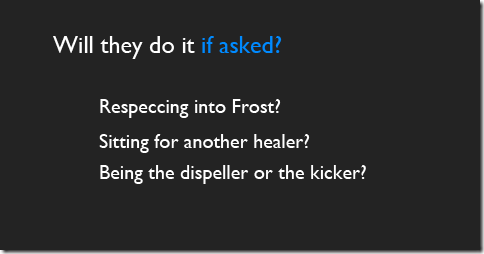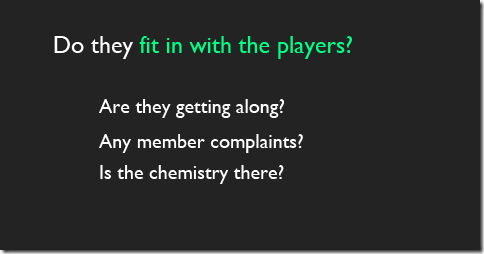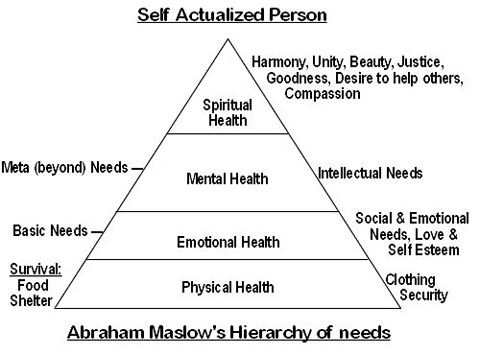In a recent episode of the Matticast, one of the topics we discussed was what guilds look for in applications. Once a player gets accepted, they typically undergo a trial process. The period could range anywhere from days to weeks. An application is a start, but it’s during this evaluation period where the recruit’s skill and attitude are truly scrutinized.
The questions vary from guild to guild, but there are 3 big ones that cross my mind.
We’re looking for the technical players. Can we count on recruits to execute? In Cataclysm raids, we want players who can easily understand and respond to the different challenges with minimal hand holding. For Conquest, things like DPS rotations are foundations that are expected before applying. If I give a Rogue a spell or an ability, I expect them to shut it down when paired up with another player. If I give tank healers their assignment, I expect tanks to survive through the worst. It shouldn’t take more than an attempt or two to stay out of fires, dodge discs or deal with any easily avoidable mechanics.
Because if a recruit can’t handle that, then we’re not the guild for them.
The nature of boss fights means there will be players who have to do the crappy job. No one really wants take on these responsibilities because they’re either:
- Boring
- Crappy
- High stress
These are the roles that won’t get you the girl, but it is a necessity all the same.
Taking one for the team and volunteering for these will amplify your value. The guy who says yes to doing the hard stuff looks better. It’s one thing if you can’t actually do your job because your class or setup prevents you from doing so. But not doing interrupts or dispels because you don’t want to and making the raid jump through hoops is a frustrating experience for leaders because we need to come up with a functional setup that might not be optimal for what we’re doing.
That’s just selfish. It might end up being the reason you get passed over for future raid invites.
Normally, I’m the guy that tackles the dispels . But it’s reassuring to know that another player or two in the raid is both able and willing to tackle the high stress jobs in the event I’m not around.
Especially with playoffs starting today. Go Canucks go!
This is actually something more along the lines of what Kat would say. Although she is the more warm and fuzzy hosts on the Matticast, I would have to back her sentiments on this one (but don’t tell her I said that, I have an image to maintain). While the aforementioned skills and willingness to do the dirty work are important, at the end of the day if recruits aren’t fitting in with the guild, then they need to get cut loose. Not every guild is right for every player. It’s easy for guilds to say yes, you’re in. It is much harder for guilds to say no, you didn’t make the cut especially after a breakout performance. Being able to recognize players who don’t fit in and acting on it swiftly will save you grief in the long run.
It was a difficult lesson for me to learn during the first year of Conquest. I had to make several compromises. I either found a way to work with troubling recruits or we didn’t raid. It took every ounce of diplomacy to maintain an uneasy peace. The two week grace period we have going lets me check out players and see if they fit in both in the raid and outside the raid. I might even join up with them in PuGs or other activities and see how they react to the banter in guild chat. I actually booted a really creepy player a few months ago because he made several members in the guild uncomfortable. But that’s a story for another time.
If you happen to recruit a player who answers positively to all of the above questions, then the odds are in your favour that they’ll be an excellent addition to your guild.





